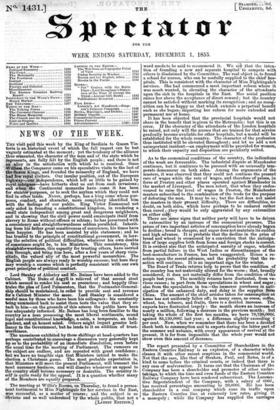As to the economical conditions of the country, the indications
of the week are favourable. The industrial dispute at Manchester continues, but it continues to be pursued with an unusually tem- perate demeanour on both sides. Among the arguments of the masters, it was observed that they could not continue the present rate of wages while the rate of wages, and therefore of prices, in force at Preston and other places operated against Manchester in the market of Liverpool. The men retort, that when they endea- voured to raise the level of wages in Preston, the Manchester masters subscribed to the combination of the trade for the purpose of defeating the men. It may be so ; but the fact does not assist the masters in their present difficulty. There are difficulties, no doubt, on both sides, which have perhaps to be endured rather than cured ; ,they would be only aggravated by any extremities on either sidt: There are .some signs that neither party will have to be driven to extremities by an increase of the economical pressure. The prices of two important articles of consumption have already begun to decline; bread is cheaper, and sugar does not maintain its sudden and high advance. It is probable that the decline in the price of bread and wheat is occasioned by a conviction that the anticipa- tion of large supplies both from home and foreign stooks is correct. It is evident also that the anticipated scarcity of sugar, whether from partial failure in the West Indies or discontinuance of the beet-manufacture in France, has been exaggerated. Hence a re- action upon the recent advance, and the probability that the re- action will continue. It is an important sign for the winter. The Board of Trade returns help to prove that the condition of the country has not materially altered for the worse ; that, broadly considered, it does not materially differ from the condition of the people last year. The monthly returns have fluctuated, from va- rious causes ; in part from those speculations in wheat and sugar; also from the speculation in tea—the immense purchases in anti- cipation of the enhanced duty, and delay in the supplies from China. The amount of the chief articles taken for consumption at home has not uniformly fallen off; in many oases, as cocoa, coffee, wheat, tea, tobacco, and fruits, there is a decided increase. The exports have fluctuated largely : the month shows an increase of nearly a million, following a decrease in the previous month; but taking the whole of the first ten months, we have 79,728,0001. against 83,130,0001. last year; a difference slightly exceeding 4 per cent. Now, when we remember that there has been a decided check both to consumption and to exports during the latter part of the summer and autumn, with every appearance of revival at the present, it is far from impossible that the whole year would not show even this amount of decrease.


























